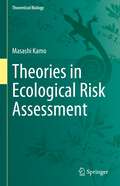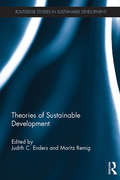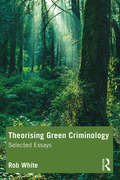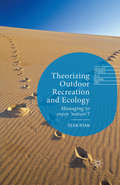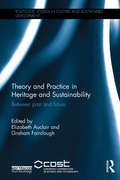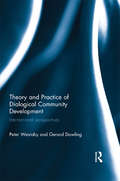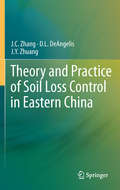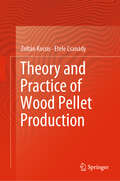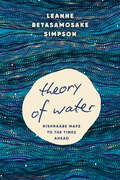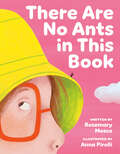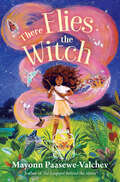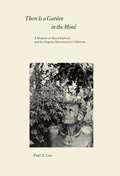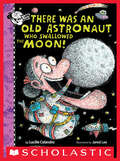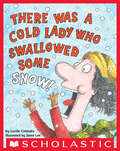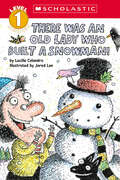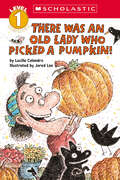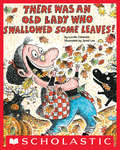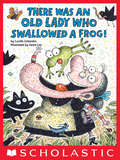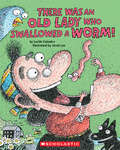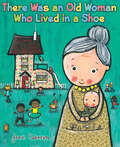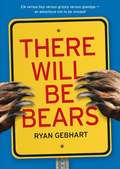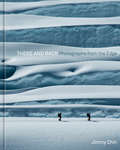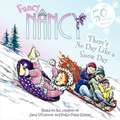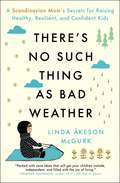- Table View
- List View
Theories in Ecological Risk Assessment (Theoretical Biology)
by Masashi KamoThis book introduces various mathematical models used in ecological risk assessment, primarily discussing models used in hazard assessment. The book aims to link ecology and conservation biology with risk assessments, bringing together the knowledge of ecotoxicology and ecology for effective risk assessment. The first part describes population-level assessment in ecological risk assessment. The chapters cover current methodologies for ecological risk assessment, individual-level assessment, population dynamics models for population-level assessment, case studies, mathematical models for population extinctions, the derivation of mean time to extinction (MTE) and their case studies. The second part of the book discusses the mathematical models involved in hazard assessments. It introduces the method of risk assessment using species sensitivity distributions (SSDs), hazard assessment of metals, chemical mixtures using the Michaelis-Menten equation, basic elements of statistics and related topics. Expected readers are risk assessors in governments and public sectors, students and young researchers interested in environmental science. The book is made accessible and easy to follow by beginners in mathematical biology and theoretical ecology.
Theories of Sustainable Development (Routledge Studies in Sustainable Development)
by Judith C. Enders Moritz RemigWhile sustainability has become a buzzword in discussions about the environment and development, work on theories of sustainable development has received much less attention. However, theory is vital as understanding the origins and development of the concept is the key to achieving successful implementation of sustainability. This book offers an interdisciplinary collection of research articles on the theories of sustainable development, drawing on a wide range of subjects including history, politics, governance, complex systems, economics and philosophy. It advocates viewing sustainable development not only as the establishment of a permanent, globally practicable and future-capable mode of life and economics, but as a complex array of problems involving a wide range of social-scientific and humanistic disciplines. This innovative approach means that the book is oriented toward current problems, not toward the established academic boundaries, and it draws out lessons that are relevant for those studying and working in sustainability across the world. This book will be of great interest to researchers and students of sustainable development and environmental politics, as well as practitioners working with sustainable development in politics, business, administration, and civil society organizations.
Theorising Green Criminology: Selected Essays
by Rob WhiteRob White’s pioneering work in the establishment and growth of green criminology has been part of a paradigm shift for the field of criminology as it has moved to include crimes committed against the environment. For the first time, this book brings together a selection of White’s essays that explore the theories, research approaches and concepts that have been instrumental to our understanding of environmental harm and eco-justice. The book provides an additional foundation for scholarship that goes beyond expression of opinion or immediate empirical finding; the emphasis is on systematic analysis and theoretically informed consideration of complex realities. It serves as a platform for further debate and discussion of green criminology’s theories, perspectives, approaches and concepts and their application to specific sub-areas such as environmental law enforcement, wildlife trafficking, pollution and climate change. Its aim is not to provide answers, but to stimulate further dedicated theoretical contemplation of environmental harms, threats to biodiversity and extinction of species. This is essential reading for all those engaged with green criminology, as well as criminological theory, eco-justice and environment and sustainability studies.
Theorizing Outdoor Recreation and Ecology (Leisure Studies in a Global Era)
by Sean RyanDeciding what user impacts are natural or unnatural has inspired much debate. Biophysically, moose cause similar kinds of soil and vegetation impacts as hikers. Yet moose are the sign of nature while hikers are the sign of damage. The field of outdoor recreation is beset with paradoxes, and this book presents a unique, alternative framework to address these dilemmas. Examining outdoor recreation through the lens of ecological theory, Ryan draws from theorists such as Foucault, Derrida and Latour. The book explores minimum impact strategies designed to protect and enhance ecological integrity, but that also require a disturbing amount of policing of users, which runs counter to the freedom users seek. Recent ecological theory suggests that outdoor recreation's view of nature as balanced when impacts are removed is outdated and incorrect. What is needed, and indeed Ryan presents, is a paradoxical and ecological view of humans as neither natural nor unnatural, a view that embraces some traces in nature.
Theory and Practice in Heritage and Sustainability: Between past and future (Routledge Studies in Culture and Sustainable Development)
by Elizabeth Auclair and Graham FaircloughThis book explores cultural sustainability and its relationships to heritage from a wide interdisciplinary perspective. By examining the interactions between people and communities in the places where they live it exemplifies the diverse ways in which a people-centred heritage builds identities and supports individual and collective memories. It encourages a view of heritage as a process that contributes through cultural sustainability to human well-being and socially- and culturally-sensitive policy. With theoretically-informed case studies from leading researchers, the book addresses both concepts and practice, in a range of places and contexts including landscape, townscape, museums, industrial sites, every day heritage, ‘ordinary’ places and the local scene, and even UNESCO-designated sites. The contributors, most of whom, like the editors, were members of the COST Action ‘Investigating Cultural Sustainability’, demonstrate in a cohesive way how the cultural values that people attach to place are enmeshed with issues of memory, identity and aspiration and how they therefore stand at the centre of sustainability discourse and practice. The cases are drawn from many parts of Europe, but notably from the Baltic, and central and south-eastern Europe, regions with distinctive recent histories and cultural approaches and heritage discourses that offer less well-known but transferable insights. They all illustrate the contribution that dealing with the inheritance of the past can make to a full cultural engagement with sustainable development. The book provides an introductory framework to guide readers, and a concluding section that draws on the case studies to emphasise their transferability and specificity, and to outline the potential contribution of the examples to future research, practice and policy in cultural sustainability. This is a unique offering for postgraduate students, researchers and professionals interested in heritage management, governance and community participation and cultural sustainability.
Theory and Practice of Dialogical Community Development: International Perspectives
by Peter Westoby Gerard DowlingThis book proposes that community development has been increasingly influenced and co-opted by a modernist, soulless, rational philosophy - reducing it to a shallow technique for ‘solving community problems’. In contrast, this dialogical approach re-maps the ground of community development practice within a frame of ideas such as dialogue, hospitality and depth. For the first time community development practitioners are provided with an accessible understanding of dialogue and its relevance to their practice, exploring the contributions of internationally significant thinkers such as P. Freire, M. Buber, D. Bohm and H.G Gadamer, J. Derrida, G. Esteva and R. Sennett. What makes the book distinctive is that: first, it identifies a dialogical tradition of community development and considers how such a tradition shapes practice within contemporary contexts and concerns – economic, social, political, cultural and ecological. Second, the book contrasts such an approach with technical and instrumental approaches to development that fail to take complex systems seriously. Third, the approach links theory to practice through a combination of storytelling and theory-reflection – ensuring that readers are drawn into a practice-theory that they feel increasingly confident has been 'tried and tested' in the world over the past 25 years.
Theory and Practice of Soil Loss Control in Eastern China
by J. C. Zhang J. Y. Zhuang D. L. DeangelisAfter the 1998 flood of the Yangtze River, one of the world's most important rivers, environmental experts realized that, to control flooding, much more attention must be paid to vegetation cover on bare lands, thin forest land, and shrub-covered land in mountain areas. In 1999, an environmental monitoring project of the forests in 11 provinces of the Yangtze River basin was undertaken. This book reports on soil loss prediction and the successful practices of soil loss control in eastern China in recent years.
Theory and Practice of Wood Pellet Production
by Etele Csanády Zoltán KocsisIn the agriculture, forestry, the primary and secondary wood working industry there are considerable resources of raw materials which can only be used in a rational manner for energetic purposes. Due to requirements from the users. one of the most retinal way of utilization is to make pellets with high density and specific energy content. Making pellets of 6-8 mm diameter, their utilization in furnaces allows an almost fully automated operation with high thermal efficiency. This book describes both the theoretical and practical aspects of pellet production including material requirements and preparation, pressing technologies, quality requirements, burning properties, investments and the overall economy of pellet production.
Theory of Water: Nishnaabe Maps to the Times Ahead
by Leanne Betasamosake SimpsonAcclaimed Nishnaabeg writer Leanne Betasamosake Simpson takes a revolutionary look at that most elemental force, water, and suggests a powerful path for the future.For many years, Leanne Betasamosake Simpson has found refuge in skiing—in all kinds of weather across different forms of terrain, often following the trail beside a beloved creek near her home. Recently, as she skimmed along this path and meditated on our world's uncertainty—including environmental devastation, the rise of authoritarianism, and the effects of ongoing social injustice—her mind turned to the ice beside her, and the snow beneath her feet. And she asked herself: What might it mean to truly listen to water? To know not only the land on which we live, but the water that surrounds and inhabits us? To coexist with and alongside water? So begins this renowned writer's quest to discover, understand, and trace the historical and cultural interactions of Indigenous peoples with water in all its forms. On her journey, she reflects on the teachings, traditions, stories, and creative work of others in her community—particularly those of her longtime friend Doug Williams, an Elder whose presence suffuses these pages; reads deeply the words of thinkers from other communities whose writing expands her own; and begins to shape a "Theory of Water" that reimagines relationships among all beings and life-forces. In this essential and inventive work, Simpson artfully weaves Nishnaabeg stories with her own thought and lived experience—and offers a vision of water as a catalyst for transformation, today and into our shared future.
Therapeutic Recreation Practice: A Strengths Approach
by Lynn Anderson Linda HeynePART ONE: FOUNDATIONS OF A STRENGTHS APPROACH TO THERAPEUTIC RECREATION PRACTICE Chapter 1: Introduction to Therapeutic Recreation Practice: A Strengths Approach Chapter 2: Paradigm Shifts - A Sea Change in Health and Human Services Chapter 3: A Sea Change in Therapeutic Recreation Chapter 4: Introducing the Flourishing through Leisure Model: An Ecological Extension of the Leisure and Well-Being Model Chapter 5: Strengths - At the Heart of Therapeutic Recreation Practice Chapter 6: Theories that Guide Strengths-Based Therapeutic Recreation Practice Chapter 7: Principles that Guide Strengths-Based Therapeutic Recreation Practice PART TWO: THE THERAPEUTIC RECREATION PROCESS IN STRENGTHS-BASED PRACTICE Chapter 8: Collaborative Practice in Therapeutic Recreation Chapter 9: Assessment in Strengths-Based Therapeutic Recreation Practice Chapter 10: Planning in Strengths-Based Therapeutic Recreation Practice Chapter 11: Implementation in Strengths-Based Therapeutic Recreation Practice Chapter 12: Transition and Inclusion in Strengths-Based Therapeutic Recreation Practice Chapter 13: Evaluation in Strengths-Based Therapeutic Recreation Practice PART THREE: PROFESSIONALISM AS A STRENGTHS-BASED THERAPEUTIC RECREATION SPECIALIST Chapter 14: Advocacy in Strengths-Based Therapeutic Recreation Practice Chapter 15: Building Your Strengths as a Therapeutic Recreation Specialist Chapter 16: Looking Ahead. . .
There Are No Ants in This Book
by Rosemary MoscoThis hilarious meta picture book from the author of Butterflies Are Pretty . . . Gross! shows us that ants aren't so bad. In fact, they're pretty amazing, and with their humongous families, they might turn your picnic into a party!Nothing can ruin a picnic faster than a bunch of ants. It's a good thing there are no ants in this book . . . well, maybe there's only one. Or two. . . . Or ten??Maybe it's not so bad. Ants are kind of cool, after all — especially the ones with amazing butts, like the Acrobat Ant that waves its back end around to scare off enemies. Or the Slender Leaf Ant that can glide through the air. Or the Dinosaur Ant, which is the biggest ant in the world! Okay, so a picnic with ants is actually lots of fun!But what if an anteater also wants to join the picnic?
There Flies the Witch
by Mayonn Paasewe-ValchevRed may not know who her true family is, but she’s determined to find out where she belongs, in this story about magic, nature, family, love, and betrayal. There Flies the Witch will enchant fans of Erin Entrada Kelly, Tae Keller, and Grace Lin.Red doesn’t remember who she is or where she came from. In fact, her only memory is a terrifying, repeating dream of a threatening shadow and a foggy field. But after many years, she wonders if that’s just something she made up.Red does know that she now belongs with Yakaka, the witch who rescued Red when she was a little girl. Full of power and magic, Yakaka travels the world, healing the planet when it calls for her help. Yakaka carries Red between the wings on her back during these journeys, teaching her the skills of witchcraft, storytelling, and healing—skills Red can never seem to master.After a dangerous mission leads to Yakaka and Red’s falling from a great height and into the stormy ocean, Red wakes up alone on a seemingly deserted island. Days later, a young boy and his mother find Red and help her recover. For the first time, Red has a friend her own age to play with, and a chance to live a different kind of life. But what happened to Yakaka?Mayonn Paasewe-Valchev explores themes of family, identity, belonging, and resilience in this truly extraordinary coming-of-age story for readers of Kelly Barnhill’s The Girl Who Drank the Moon, Lauren Wolk’s Beyond the Bright Sea, and Laurel Snyder’s Orphan Island.
There Is a Garden in the Mind
by Paul A. LeeThere Is a Garden in the Mind presents an engaging look at the work and life of pioneering organic gardener Alan Chadwick and his profound influence on the organic farming movement. In this wide-ranging and philosophical memoir, author Paul Lee recounts his first serendipitous meeting with Chadwick in Santa Cruz, California, in 1967, and their subsequent founding of the Chadwick Garden at UC Santa Cruz, the first organic and biointensive garden at a U.S. university. Today, there are few who would dispute the ecological and health benefits of organically produced food, and the student garden project founded by Chadwick and Lee has evolved into a world-renowned research center that helps third-world farmers obtain high yields using organic gardening. But when Chadwick and Lee first broke ground in the 1960s, the term "organic" belonged to the university's chemists, and the Chadwick Garden spurred a heated battle against the whole system of industrial existence. Lee's memoir contextualizes this struggle by examining the centuries-old history of the conflict between industrial science and organic nature, the roots of the modern environmental movement and the slow food movement, and the origin of the term "organic." His account of Chadwick's work fills in a gap in the history of the sustainable agriculture movement and proposes that Chadwick's groundwork continues to bear fruit in today's burgeoning urban garden, locavore, and self-sufficiency movements.Table of contents:Chapter one The English Gardener ArrivesChapter two The English Gardener Goes to WorkChapter three The Garden PlotChapter four Goethe the Vitalist contra Newton the PhysicalistChapter five Urea! I Found It!Chapter six USA and Earth DayChapter seven The MethodChapter eight Chadwick DepartsChapter nine A Moral Equivalent of WarChapter ten The Death of ChadwickChapter eleven California Cuisine and the Homeless Garden ProjectChapter twelve A Biodynamic Garden on Long IslandChapter thirteen Chadwick's LegacyFrom the Trade Paperback edition.cy
There Was An Old Astronaut Who Swallowed the Moon! (There Was an Old Lady)
by Lucille ColandroScholastic's bestselling OLD LADY becomes an astronaut in this adventure full of hilarious laughs and fun facts about space -- perfect for the 50th anniversary of the moon landing!There was an old astronaut who swallowed the moon. I don't know why she swallowed the moon. It happened at noon.Scholastic's bestselling OLD LADY returns in this adventure series with a nonfiction twist that will make you laugh AND learn! In this spin-off, the OLD LADY turns into an OLD ASTRONAUT who travels through space, swallowing a moon... along with a star, a planet, a comet, a meteor, a rocket, and a satellite... Why? Well, it went down just right, that bright satellite! Two new characters lead the reader through this hilarious adventure while exchanging some awesome facts about outer space for a light take on nonfiction that's perfect for this age. With expanded back matter about the solar system and a search-and-find game at the end, this OLD ASTRONAUT definitely shoots for the stars!
There Was a Cold Lady Who Swallowed Some Snow! (Digital Read Along)
by Lucille ColandroHere's the newes twist on the familiar tale of There Was an Old Lady Who Swallowed a Fly. There was a cold lady who swallowed some snow.I don't know why she swallowed some snow. Perhaps you know. This time, the old lady is swallowing everything from snow to a pipe, some coal, a hat, and more! With rollicking, rhyming text and funny illustrations, this lively version will appeal to young readers with every turn of the page. And this time, there's a surprise at the end no reader will be able to guess!Includes read-along audio track.
There Was an Old Lady Who Built a Snowman! (Scholastic Reader, Level 1)
by Lucille ColandroThe Old Lady from There Was an Old Lady Who Swallowed a Bat! is back for a snowy adventure -- now in a bestselling Level 1 Reader format!The old lady says, ''Look, it's snow!''''Come on pup. Here we go!''Put on gloves and warm blue hat.Then walk on a snowy path.The Old Lady enjoys a snowy day in this Level 1 story featuring simple sentences, words to sound out, and rhymes just right for the beginning reader! Scholastic Readers encourage the joy and fun of reading with topics that kids love -- perfect for children beginning to read on their own!
There Was an Old Lady Who Picked a Pumpkin! (Scholastic Reader, Level 1)
by Lucille ColandroThe Old Lady from There Was an Old Lady Who Swallowed a Bat! is back for a fall adventure -- now in a bestselling Level 1 reader format!The old lady says "Hooray!"We have a trip today!Grab your bag. Say hello!Get on the bus. Off we go!The Old Lady heads to the farm in this Level 1 story featuring simple sentences, words to sound out, and rhymes just right for the beginning reader! Scholastic Readers encourage the joy and fun of reading with topics that kids love -- perfect for children beginning to read on their own!
There Was an Old Lady Who Swallowed Some Leaves!
by Lucille ColandroGet ready to fall over laughing in this autumnal-themed story featuring everyone's favorite old lady!That lovely old lady is ready for her fall comeback! What can you make from leaves, clothes, a pumpkin, and rope? Only this old lady knows the secret!With rhyming text and funny illustrations, this lively version of the classic song will appeal to young readers with every turn of the page--a fun story to get ready for the fall season.
There Was an Old Lady Who Swallowed a Frog! (There Was An Old Lad Ser.)
by Jared Lee Lucille ColandroSpring is in the air, and everyone's favorite old lady is ready to celebrate!That zany old lady is back--and with a serious case of spring fever! This time she's swallowing items to make the most of the season...with a beautiful garden!With rhyming text and funny illustrations, this lively version of the classic song will appeal to young readers with every turn of the page--a wacky story for the first day of spring!
There Was an Old Lady Who Swallowed a Worm!
by Lucille ColandroCelebrate Earth Day with a twist on the classic song from the bestselling There Was an Old Lady series for kids! You’ll never guess what she’ll swallow next!There was an old lady who swallowed a worm.I don’t know why she swallowed the worm,but she started to squirm!The Old Lady is back and this time she's swallowing a worm, some dirt, a flower, a bee, a bird...and more! This Earth Day-themed twist on the classic rhyme will delight and entertain young readers, both old and new!Also in the There Was an Old Lady series:There Was an Old Lady Who Swallowed a Dragon!There Was an Old Lady Who Swallowed a Shell!There Was an Old Lady Who Swallowed Some Leaves!and more!
There Was an Old Woman Who Lived in a Shoe (Jane Cabrera's Story Time)
by Jane CabreraFall in love with this bright, ecofriendly take on a favorite rhyme for children. &“There was an old woman who lived in a shoe, and some days were just a big Hullabaloo!&” Readers follow along as a woman and her household of high-spirited children and their pets reuse and recycle everyday items. The crew repair their broken furniture, find alternative modes of transportation when the car breaks down, and remake worn clothing with colorful patches. Jane Cabrera&’s charming acrylic artwork is perfect for sharing with young readers and listeners.
There Will Be Bears
by Ryan GebhartThirteen-year-old Tyson loves hanging out with his roughneck Grandpa Gene, who’s a lot more fun than Tyson’s ex–best friend, Brighton. These days, Bright just wants to be seen with the cool jocks who make fun of Tyson’s Taylor Swift obsession and dorky ways. So when Grandpa Gene has to move to a nursing home that can manage his kidney disease, Tyson feels like he’s losing his only friend. Not only that, but Tyson was counting on Grandpa Gene to take him on his first big hunt. So in defiance of Mom and Dad’s strict orders, and despite reports of a scary, stalking, man-eating grizzly named Sandy, the two sneak off to the Grand Tetons. Yes, there will be action, like shooting and dressing a six-hundred-pound elk. Is Tyson tough enough? There will be heart-pounding suspense: is Grandpa Gene too sick to handle the hunt, miles away from help? And, oh yes, there will be bears. . . .
There and Back: Photographs from the Edge
by Jimmy ChinThe Academy Award–winning director of Free Solo and National Geographic photographer presents the first collection of his iconic adventure photography, featuring some of the greatest moments of the most accomplished climbers and outdoor athletes in the world, and including more than 200 extraordinary photographs. <p><p> Jimmy Chin goes where few can follow to capture stunning images in death-defying situations. There and Back draws from his breathtaking portfolio of photographs, captured over twenty years during cutting-edge expeditions on all seven continents—from skiing Mount Everest, to an unsupported traverse of Tibet's Chang Tang Plateau on foot, to first ascents in Chad’s Ennedi Desert and Antarctica’s Queen Maud Land. <p><p> Along the way, Chin shares behind-the-scenes details about how he captured such astounding images in impossible conditions, and tells the stories of the legendary adventurers and remarkable athletes he has photographed, including Alex Honnold, the star of his Academy Award–winning documentary film Free Solo; ski mountaineer Kit DesLauriers; snowboarder Travis Rice; and mountaineers Conrad Anker and Yvon Chouinard. These larger-than-life images, coupled with stories of outsized drive and passion, of impossible goals with life or death stakes, of partnerships forged through incredible hardship, are sure to inspire wonder and awe.
There's No Day Like a Snow Day
by Jane O'ConnorEven a snow day is fancy when Nancy is around! Ooh la la! It's a blizzard. School is cancelled. And Nancy, JoJo, Bree, and Freddy are tres excited to go outside and play. From making snow angels to building snowmen to catching snowflakes...everyone has "snow" much fun!
There's No Such Thing as Bad Weather: A Scandinavian Mom's Secrets for Raising Healthy, Resilient, and Confident Kids (from Friluftsliv to Hygge)
by Linda Åkeson Mcgurk“A perfect antidote to the hyper-vigilant, extra-electrified, standardized-tested, house-arrested, 21st-century childhood.” —Richard Louv, bestselling author of Last Child in the Woods and Vitamin N Bringing Up Bébé meets Last Child in the Woods in this lively, insightful memoir about a mother who sets out to discover if the nature-centric parenting philosophy of her native Scandinavia holds the key to healthier, happier lives for her American children.When Swedish-born Linda McGurk moved to small-town Indiana with her American husband to start a family, she quickly realized that her outdoorsy ways were not the norm. In Sweden children play outside all year round, regardless of the weather, and letting young babies nap outside in freezing temperatures is not only common—it is a practice recommended by physicians. In the US, on the other hand, she found that the playgrounds, which she had expected to find teeming with children, were mostly deserted. In preschool, children were getting drilled to learn academic skills, while their Scandinavian counterparts were climbing trees, catching frogs, and learning how to compost. Worse, she realized that giving her daughters the same freedom to play outside that she had enjoyed as a child in Sweden could quickly lead to a visit by Child Protective Services. The brewing culture clash finally came to a head when McGurk was fined for letting her children play in a local creek, setting off an online firestorm when she expressed her anger and confusion on her blog. The rules and parenting philosophies of her native country and her adopted homeland were worlds apart. Struggling to fit in and to decide what was best for her children, McGurk turned to her own childhood for answers. Could the Scandinavian philosophy of “there is no such thing as bad weather, only bad clothes” be the key to better lives for her American children? And how would her children’s relationships with nature change by introducing them to Scandinavian concepts like friluftsliv (“open-air living”) and hygge (the coziness and the simple pleasures of home)? McGurk embarked on a six-month-long journey to Sweden to find out. There’s No Such Thing as Bad Weather is a fascinating personal narrative that highlights the importance of spending time outdoors, and illustrates how the Scandinavian culture could hold the key to raising healthier, resilient, and confident children in America.
